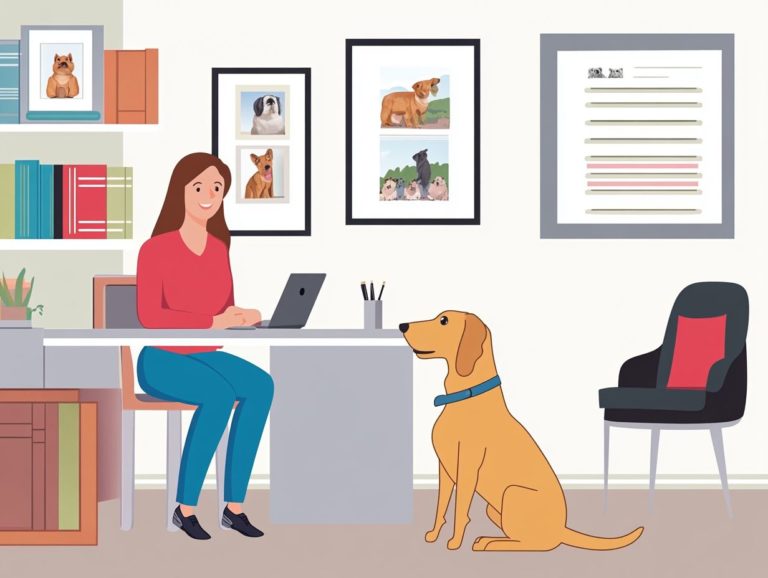What Should I Know About Anxiety in Senior Pets?
As your cherished pets grow older, they may encounter various challenges, one of which is anxiety. It’s vital to understand anxiety in senior pets for their happiness and comfort!
This article delves into the causes of anxiety, examining both physical and environmental factors. It also looks at treatment options, ranging from medications to therapies, and offers tips on creating a serene environment to help prevent anxiety. Join the journey in ensuring your senior pet enjoys a happier, more relaxed life.
Contents
- Key Takeaways:
- Anxiety in Senior Pets
- Causes of Anxiety in Senior Pets
- Recognizing Symptoms of Anxiety in Senior Pets
- Treatment Options for Anxiety in Senior Pets
- Preventing Anxiety in Senior Pets
- Frequently Asked Questions
- What Should I Know About Anxiety in Senior Pets?
- What are the signs of anxiety in senior pets?
- What can cause anxiety in senior pets?
- How can I help my senior pet with anxiety?
- Should I consult a veterinarian for my senior pet’s anxiety?
- Are there any natural remedies for senior pet anxiety, including CBD oil and hemp oils?
Key Takeaways:
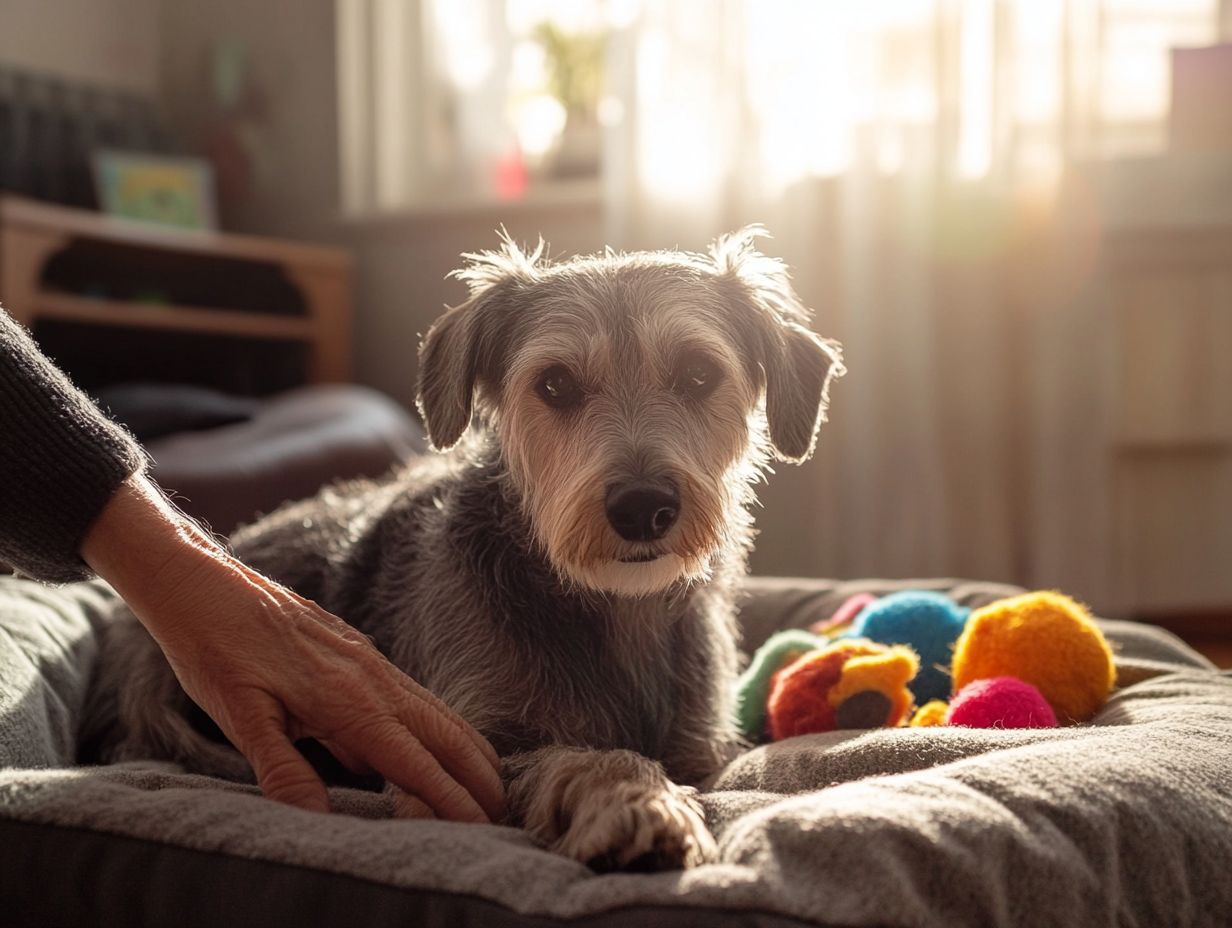
- Senior pets can experience anxiety, just like humans. It’s important to understand the potential causes and symptoms to provide proper care and treatment.
- Anxiety in senior pets can be caused by physical changes, such as pain or decreased sensory function, as well as changes in their environment.
- Pet owners must be aware of behavioral and physical signs of anxiety in senior pets, such as excessive barking or panting, to address the issue and improve their quality of life.
Anxiety in Senior Pets
This condition, often termed dog anxiety, can reveal itself in many ways, from destructive actions to aggression or even separation anxiety.
As noted in the Merck Veterinary Manual and supported by the AKC, recognizing and addressing these anxiety symptoms in senior dogs is crucial for their well-being and overall health. Your attentiveness can truly make a difference in their lives.
Understanding Anxiety in Older Animals
Anxiety in older animals, especially dogs, is a pressing issue that can profoundly impact their behavior and well-being, often leading to anxiety disorders, which are conditions that cause excessive fear or worry, that necessitate behavioral treatment.
As dogs age, they may experience a decline in cognitive function or encounter changes in their environment, both of which can intensify feelings of unease. Physiological changes, like reduced sensory perception, can turn familiar situations into sources of anxiety. Psychological factors, such as a loss of social connections or disruptions to their routine, can add to their stress.
Common triggers like loud noises, new environments, or shifts in family dynamics can elevate anxiety levels in these senior pets. Recognizing the signs of anxiety early such as pacing, excessive barking, or changes in appetite is essential for implementing effective management strategies.
This proactive approach can lead to a healthier and more comfortable life for your aging canine companion.
Causes of Anxiety in Senior Pets
Understanding the common causes of anxiety in senior pets is crucial for effective prevention and treatment. Various physical and environmental factors can profoundly impact a dog s mental health, making it important for you to recognize and address these influences.
Physical and Environmental Factors
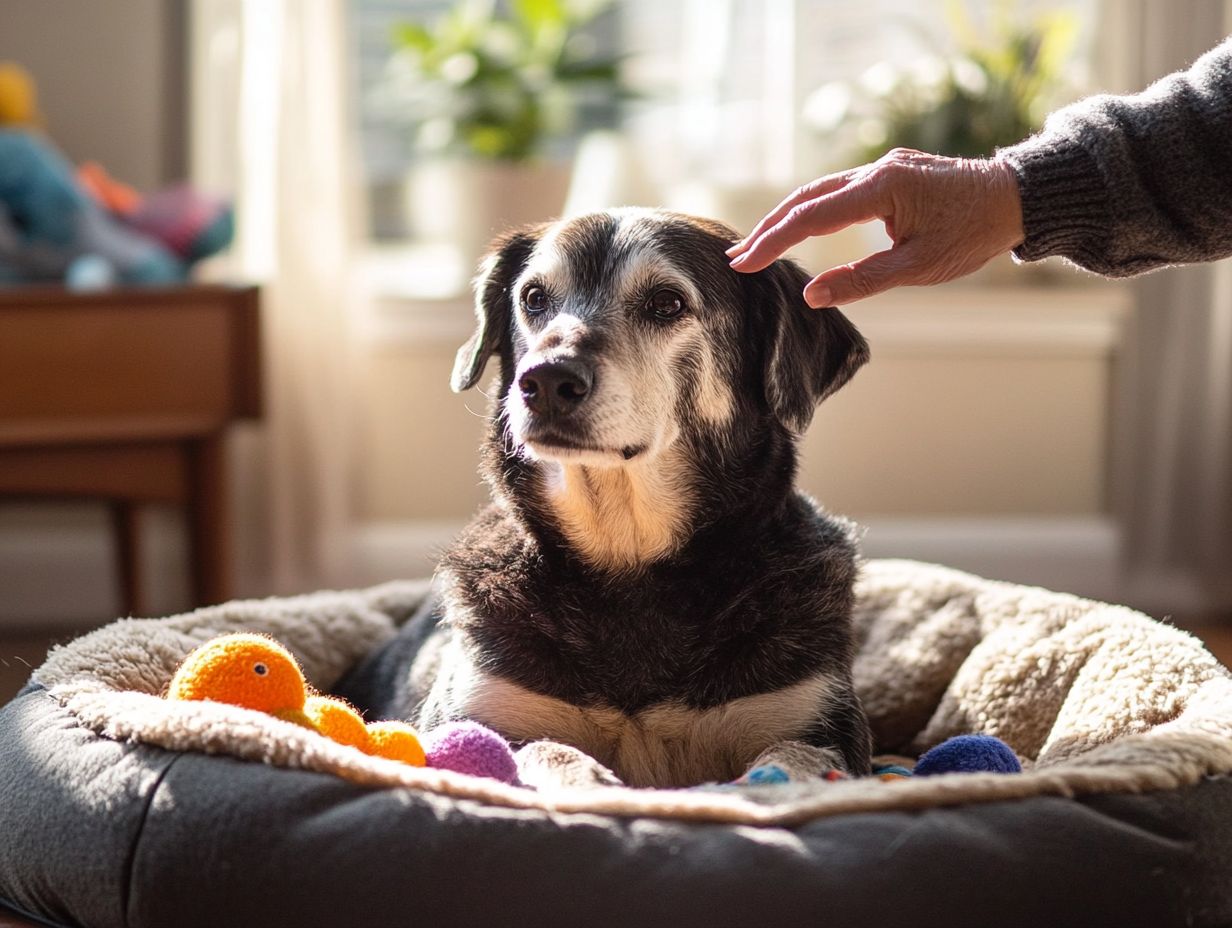
Physical and environmental factors significantly influence dog anxiety, particularly in senior dogs, who may display anxiety symptoms due to changes in their habitat or health.
As dogs age, their physical health can decline, leading to issues like arthritis or diminished vision, leaving them feeling vulnerable and uneasy in their environment. Changes in their surroundings, such as adding new family members or relocating to a different home, can create a sense of instability that overwhelms these senior companions, triggering anxiety or fear.
It’s crucial for you as a pet owner to recognize that elderly dogs may struggle with sudden changes. Adjustments to their routine or environment can intensify feelings of uncertainty and discomfort, making it essential to approach these transitions with care and consideration.
Take action now to improve your pet’s comfort and joy! In summary, understanding anxiety in senior pets, recognizing its signs, and being aware of its causes are the first steps toward ensuring their well-being.
Recognizing Symptoms of Anxiety in Senior Pets
Recognizing anxiety symptoms in senior pets is essential for you as a dog owner. Behaviors such as destructive tendencies and signs of separation anxiety can indicate deeper issues affecting your beloved companion’s well-being.
By being attuned to these signals, you can ensure that your pet receives the care and attention they deserve.
Behavioral and Physical Signs
Behavioral and physical signs of anxiety in senior dogs often manifest as changes in appetite, excessive licking, and noticeable shifts in body language that reflect distress.
These symptoms can be quite subtle at first. However, they might intensify over time, making it essential for you to remain vigilant. For example, a once-social dog may begin to avoid interactions and retreat to a hiding spot whenever visitors arrive.
You might observe your pet pacing or displaying a nervous demeanor, such as drooping ears or a tucked tail, which are clear indicators of discomfort. Some senior dogs may even start vocalizing more, whining or barking as a means to express their unease.
By understanding these anxiety symptoms, you can provide the necessary support, ensuring your beloved pet feels safe and cherished during those stressful moments.
Treatment Options for Anxiety in Senior Pets
Exploring treatment options for anxiety in your senior pets is crucial for providing them with the relief they deserve. As a dedicated dog owner, you have access to various avenues, including anxiety medications, calming supplements, and tailored behavioral interventions guided by a professional dog trainer.
These resources can significantly enhance your furry companion’s quality of life and help them navigate their golden years with ease. Start exploring these options today for a happier, healthier pet!
Medications and Therapies
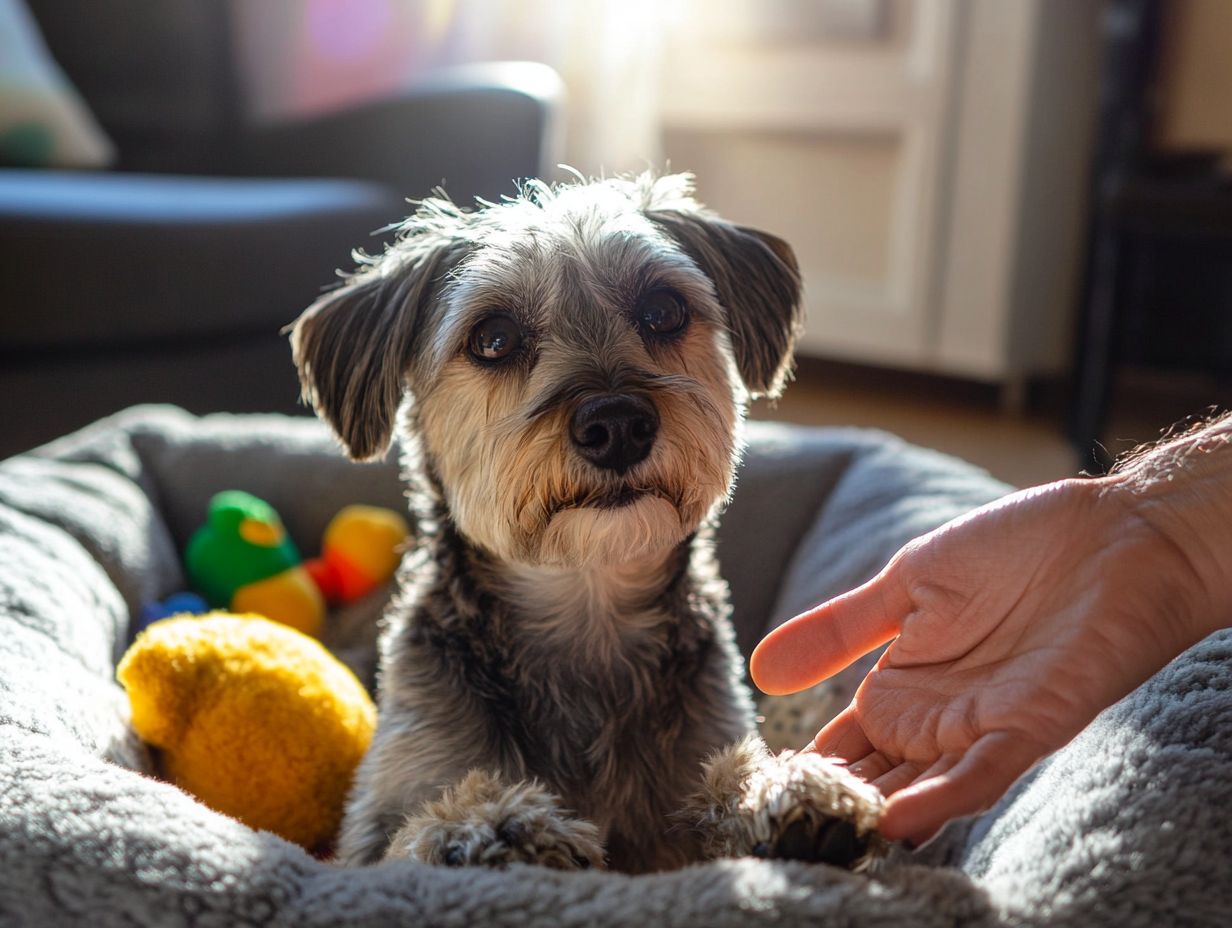
Medications and therapies for anxiety in senior pets encompass a range of options, including traditional medications like fluoxetine and clomipramine, as well as natural remedies such as CBD oil and calming supplements.
These treatments are specifically crafted to help manage anxiety symptoms that may arise from various factors be it changes in the environment, the loss of a companion, or the natural progression of aging.
Fluoxetine, a type of medication that helps with mood, often proves effective for long-term management, while clomipramine may address specific anxiety-related disorders.
If you’re inclined toward a more holistic approach, CBD oil and calming supplements made from natural ingredients like chamomile and valerian root offer alternatives that can complement or even replace pharmaceuticals.
Finding the right course of action requires keen observation. In some cases, consulting with a veterinarian to develop a tailored treatment plan that meets your pet’s unique needs is essential.
Preventing Anxiety in Senior Pets
To prevent anxiety in senior pets, you must create a calming environment and implement effective training strategies that prioritize the well-being of your canine companion.
By focusing on these essential elements, you can help your beloved pet feel more secure and content in their golden years.
Creating a Calm and Comfortable Environment
Creating a calm and cozy space for your pet is an exciting way to reduce their anxiety! It helps mitigate anxiety symptoms and encourages positive behavior.
By establishing safe spaces within your home, you can offer a sanctuary for your furry companion to retreat to when feeling overwhelmed. Familiar routines are equally important; by maintaining regular feeding, walks, and playtimes, you significantly reduce any uncertainty they might feel.
Incorporating sensory enrichment think soothing sounds, calming scents, and interactive toys can engage their interest while helping to ease any restlessness. Adapting your living space with calming d cor and minimizing disruptive noises will cultivate a peaceful atmosphere that promotes relaxation.
Frequently Asked Questions
What Should I Know About Anxiety in Senior Pets?
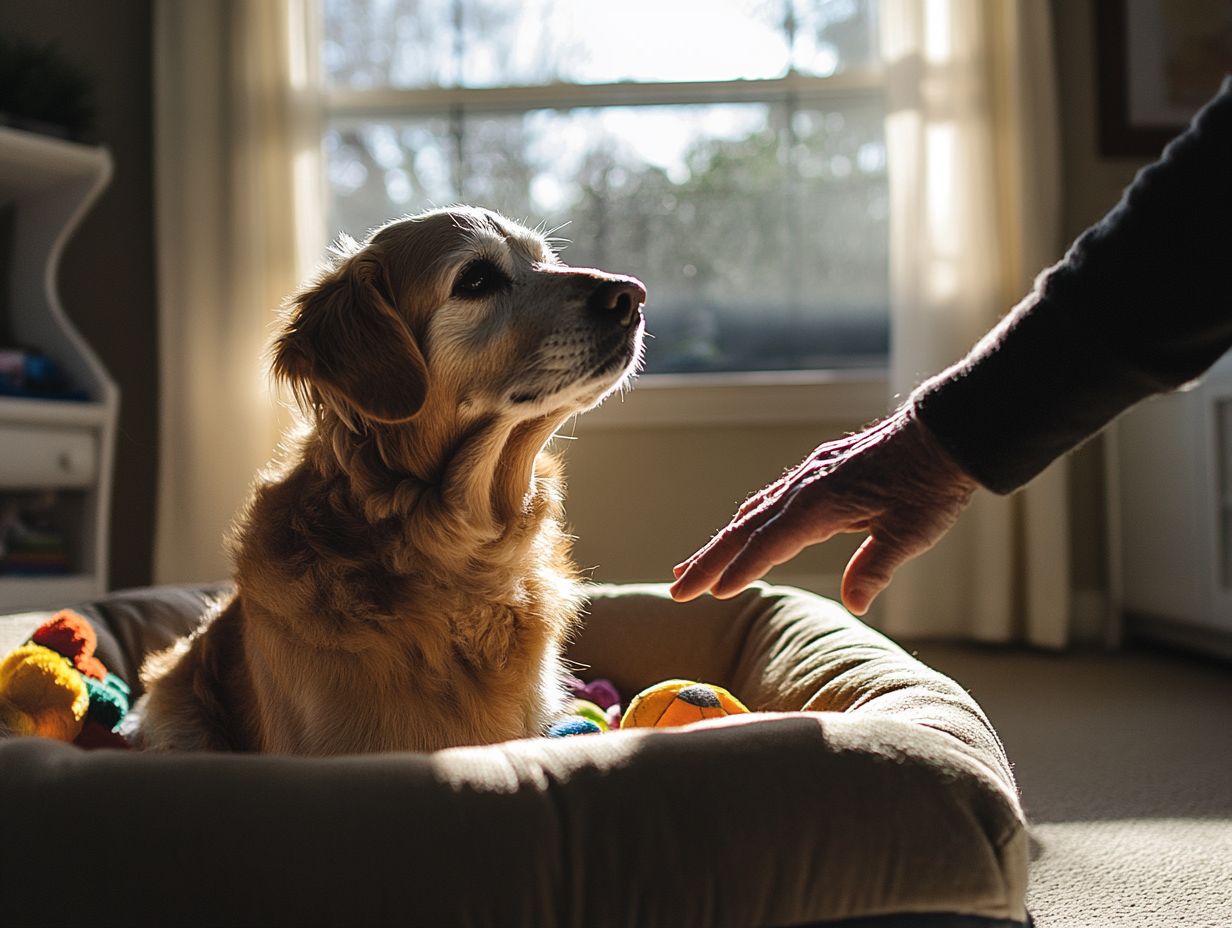
Anxiety is a common issue in senior pets, and it’s important for pet owners to understand therapy for anxious pets to recognize and manage it effectively.
What are the signs of anxiety in senior pets?
Some common signs of anxiety in senior pets include excessive panting, pacing, restlessness, trembling, and increased vocalization.
What can cause anxiety in senior pets?
Various factors can cause anxiety in senior pets. Common causes include changes in routine, health problems, and memory issues.
How can I help my senior pet with anxiety?
There are several ways to help your senior pet with anxiety. You can provide a safe and comfortable environment, stick to a regular routine, and offer mental and physical stimulation.
Should I consult a veterinarian for my senior pet’s anxiety?
Spotting anxiety in your senior pet? It’s crucial to act fast! If you notice signs of anxiety, consult your veterinarian. They can rule out any underlying health issues and offer recommendations for managing your pet’s anxiety.
Are there any natural remedies for senior pet anxiety, including CBD oil and hemp oils?
You can also consider natural remedies to help with anxiety in senior pets. These may include calming supplements, essential oils, and pheromone therapy. However, don’t wait! It’s important to consult with your veterinarian before trying any new remedies.


